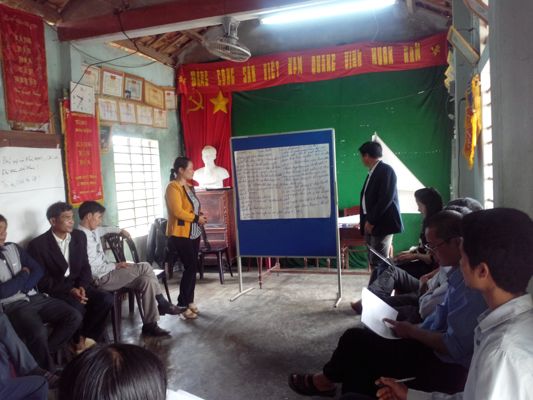The Seminar to Consolidate the Operation of the Key Farmer Network in Quang Ninh district, Quang Binh province
Posted at: THUrsday - 03/04/2014 13:36 - post name: admin
The Key Farmer Network of Quang Ninh district includes two networks in Truong Xuan commune and Truong Son commune. The network was supported to establish by Rural Development and Poverty Reduction Fund and Quang Ninh District Fatherland Front Committee in 2011. At the present, the key farmer network of Truong Xuan commune includes 7 groups and 42 members; the network Truong Son commune includes 10 groups and 52 members.
In March 2014, RDPR supported for the network of Truong Xuan and Truong Son to organize two review meetings for the first quarter 2014. The participant of the meetings are leaders of the network and representatives of groups, and project officers of RDPR.
At the meetings, key farmer groups shared their obtained results in recent time, difficulties in the operation process as well as identify problems of communities which need the support of the groups to be resolved. The groups also shared their experience and skills on communication and reflection/suggestion.

The Seminar to Consolidate the Operation of the Key Farmer Network in Quang Ninh district, Quang Binh province
With their mission, from the start of formation, the key farmer groups operated actively in collect policies and laws of the State and local authorities to popularize to communities such as policies for the poor, capital loaning policies, land and forest allocation, traffic secure, gender equality, environment protection, etc so that communities understand and implement their rights and obligations, as well as benefit from supporting policies of the State. As an example, in Hang Chuon village, Truong Xuan commune, thanks to the support of the key farmer network, 7 households is loaned without interest, 22 out of 36 households are allocated production land and granted Red Book (Certificates of Land Use Rights).
Almost of the groups share the existing difficulties they are facing with are the ability and capacity of the people, especially ethnic minorities, the shortage of media means and finance. Moreover, the communication, reflection/suggestion skills of many members of these networks is still not good.
The priority issue in coming time of the groups are identified to be the shortage problem of production land and red book; raising local people’s capacity on policies and laws, the shortage problem of seeds, technologies; and enhancing forest protection and development.
Author: RDPR
Key:
the key, farmer network, of quang, ninh district, includes two, networks in, truong xuan, commune and, truong son, commune the, network was, supported to, establish by, rural development, and poverty, reduction fund, and quang, fatherland front, committee in, 2011 at, the present, of commune, groups and, 42 members, the network, commune includes, 10 52












